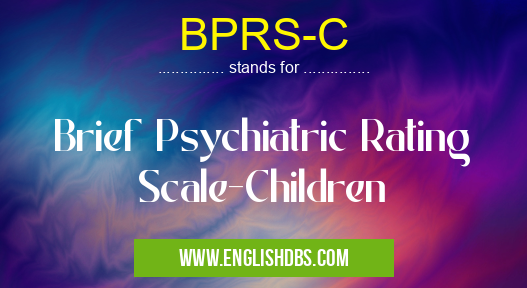What does BPRS-C mean in BRITISH MEDICINE
The Brief Psychiatric Rating Scale-Children (BPRS-C) is a widely used tool for assessing the severity of mental health symptoms in children and adolescents. It is designed to measure the level of distress associated with both acute and chronic psychological problems in this population.

BPRS-C meaning in British Medicine in Medical
BPRS-C mostly used in an acronym British Medicine in Category Medical that means Brief Psychiatric Rating Scale-Children
Shorthand: BPRS-C,
Full Form: Brief Psychiatric Rating Scale-Children
For more information of "Brief Psychiatric Rating Scale-Children", see the section below.
Essential Questions and Answers on Brief Psychiatric Rating Scale-Children in "MEDICAL»BRITMEDICAL"
What is the BPRS-C?
The BPRS-C is a brief psychiatric rating scale designed to assess the severity of mental health symptoms in children and adolescents.
What types of mental health symptoms does the BPRS-C measure?
The BPRS-C measures levels of distress associated with both acute and chronic psychological problems in children and adolescents.
Who uses the BPRS-C?
The BPRS-C is commonly used by healthcare professionals, such as psychologists, psychiatrists, and social workers, when diagnosing and monitoring young people's mental health conditions.
What information does the BPRS-C provide?
The BPSR-C provides an overall assessment of a child or adolescent's mental status at that given moment. It can also be used to track changes in symptoms over time.
Are there any limitations to using the BPSR-C?
One limitation to using this tool is that it only captures certain types of symptoms; it may not detect milder forms of psychological distress. Additionally, it can be hard to interpret results if there are other complicating factors, such as physical illness or trauma.
Final Words:
The Brief Psychiatric Rating Scale — Children (BPRS-C) is a reliable tool for measuring levels of distress associated with mental health issues in children and adolescents. It provides information about overall symptom severity at any given point and can be used to track progress over time. Although there are some limitations to its use, it is still a valuable tool for identifying possible areas of concern in young people's lives.
